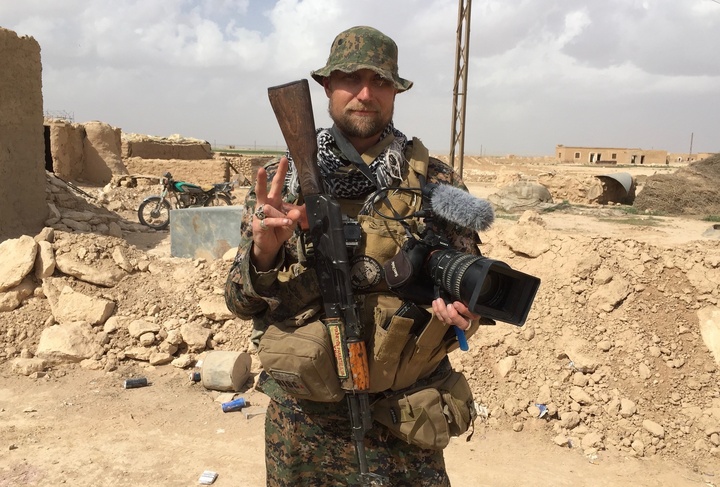
Documentary filmmaker and Humboldt County resident River O’Mahoney Hagg, above, spent six months in Syria as a volunteer combat medic for a Kurdish militia and 19 days locked in an Iraqi prison. | All photos courtesy Hagg unless otherwise noted.
This past February, Humboldt County native River O’Mahoney Hagg stood on a cliff in Iraq and made a decision that would change his life. He’d flown to the Middle East hoping to make a documentary about the civil war in Syria, but when he arrived in the troubled region his plans quickly went sideways. Standing on that cliff he was presented with a choice, and his decision led him to the front lines of the war where he found himself alternately patching wounds as part of a combat medical unit, shooting footage for his documentary and firing an AK-47 in chaotic conflicts with the world’s most reviled terrorist group, ISIS.
This is his story, as recounted last week by Hagg himself in the living room of an elegant Victorian on Third Street in Eureka. His wife, Samantha Summers, who’s been busy converting the Victorian home into a boutique hotel, also spoke to the Outpost. She looked dazed by River’s dramatic homecoming, the latest in a series of upheavals that have strained their marriage to the breaking point.
With the lanky build of a street skater and the stubble-framed handlebar mustache of a biker (which he is), Haag sat casually on an antique sofa.
“I was born up on Kneeland mountain in a little trailer, and I lived off and on here [in Humboldt County] growing up,” he said. His parents divorced when he was young, and he and his siblings spent summers here with their dad and the rest of the year with their mom, moving over the years to Oregon, Washington, Virginia and Hawaii. As young kids they weren’t allowed to watch TV or eat meat or sugar.
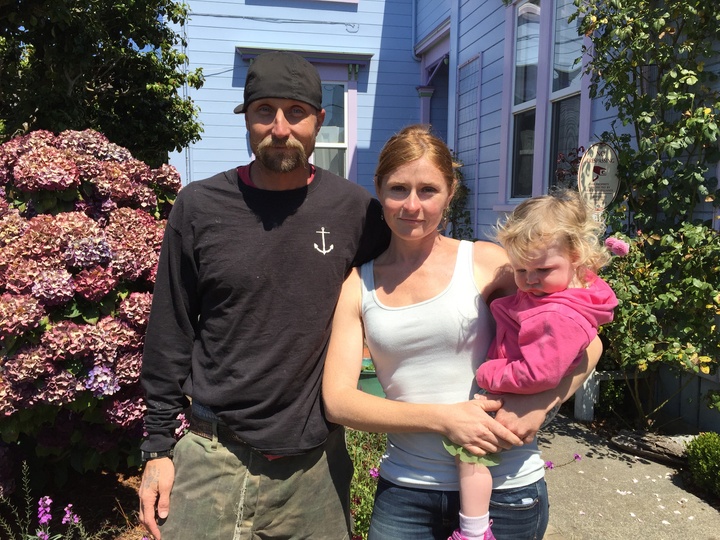
Hagg and Summers with their daughter Alyna-Rose outside The Victorian Eureka, a boutique hotel they own. | Photo by Ryan Burns.
“It was an alternative childhood to say the least, but she always did right by us, kept us clothed and fed,” he said. His full name — River Rainbow O’Mahoney Hagg — attests to his parents’ unconventional worldview, which he seems to have adopted. (He and his wife have two daughters: Arcata Rainbow, 6, and Alyna-Rose, 18 months.)
Drawn to storytelling, Hagg tried to start a video production company as a young adult. It failed, and at age 23 he joined the Navy where he served as a fireman and medic. A knee injury sidetracked him into what he called “this loser job selling cars at the world’s worst car dealership,” in San Diego. But eventually he worked his way back into video production. In 2005 he met a veteran TV writer/director named Gordon Forbes, III, who was about to head to Iraq to shoot a documentary series called Alpha Company: Iraq Diary.
Hagg was intrigued. He wanted to tell stories that got beyond the simplistic propaganda of many military TV shows, and he saw this as “an opportunity to mentor with a master of the craft in incredibly intense environment,” he said. He also had a darker motive: “I felt inexplicably drawn towards conflict.”
Hagg begged Forbes to let him join the production, and he wound up spending seven months as a field producer based at Camp Fallujah. The production team followed members of the U.S. Marine Corps Force Reconnaissance, aka the Recon Marines, as they traveled through war zones and civilian territories in up-armored Humvees.
“It was horrible,” Hagg said. “We’d drive around, see kids get shot and there’d never be anybody to shoot back at.” By “kids” he means soldiers. Now 41, Hagg refers to anyone under 30 as a kid, which is how the young Marines appeared to him. While doing “knock-and-talks” with Sunni civilians they faced constant threats including sniper fire, RPGs, mortar rounds and IEDs. Hagg recalled one “kid” who was shot in the face by a sniper round that blew his jaw off as he stood next to his buddy.
The stress took a toll, as it does for many who experience war. “I came back from Iraq angry,” he said. “I was just really easy to set off. I started drinking a lot. I could just go off at any point.”
The experience did launch his career as a producer and cinematographer. Over the next several years he worked on various TV documentaries, slasher movies and indie films, including a collaboration with his dad on the locally filmed 2006 feature Escape in Time. He and his wife moved to Los Angeles, and Hagg was away from home for months at a time working on projects. He became a senior producer for the popular action-adventure reality series Wicked Tuna on the National Geographic Channel and spent long stretches in Alaska, leaving his wife and young daughter behind.
“I was used to him being gone,” Summers said matter-of-factly. “Since my first daughter Arcata was born in 2009 he’s pretty much been gone.”
Hagg had acknowledged as much in our conversation. “It got to the point where I was never home,” he said. “That’s why I suggested to the wife that we move back up here.”
In 2013 they moved to Eureka and purchased a Victorian home built by 19th century lumber baron William Carson. Summers, who had earned a master’s degree in interior architecture, wanted to convert the stately house into a hotel. (Over the years it has been a private home, a brothel and a bed & breakfast.) They also bought a place in Fieldbrook, hoping to turn it into a vacation rental.
Hagg was back to the county of his birth, but he wasn’t ready to settle down. In 2014 he traveled to Afghanistan as the shooting producer for a war documentary series called The Fighting Season, produced by Ricky Schroder (of Silver Spoons and NYPD Blue fame). Hagg and Schroder started talking to crew members about Syria, a region beset by extremism and cultural strife yet still a mystery to most Americans.
“I felt that there was a real rich story to be told there somewhere,” Hagg said. “I just didn’t know what it was.”
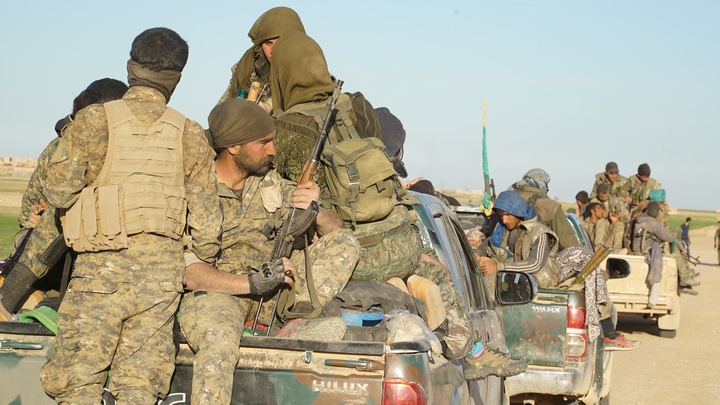
Members of the Kurdish militia YPG work to clear Syrian villages during the Al-Shaddadi offensive in March 2016.
He and Schroder began developing the documentary project last year. In the course of their research Schroder contacted a man named Harry Rowe, a British civilian who had traveled to Syria to volunteer as a freedom fighter with the YPG, or People’s Protection Units, a primarily Kurdish militia from the northern Syrian region known as Rojava.
Rowe wasn’t the only Westerner to have joined the YPG, which serves as the military arm of a Syrian faction that controls a stretch of land sandwiched between ISIS territories in northern Syria and Turkey. The YPG (for men) and YPJ (women) have actively sought foreign volunteers, even using a Facebook page called “Lions of Rojava” as a recruiting tool. A number of Americans, outraged by ISIS’s terrorist acts, have volunteered for the YPG, as the New York Times reported last year. To Hagg, these vigilantes seemed like perfect subjects for a documentary.
The project was gaining steam until late last year, when Schroder got sick and, on Dec. 26, canceled the production altogether. Hagg was deeply disappointed. With two daughters and two mortgages at home, he’d been counting on the paycheck and health insurance that came with the gig. Plus he’d envisioned this as a turning point in his career, a chance to break through as the director and storyteller he’s longed to be.
He still wanted to go to Syria and told his wife as much. “She was not happy at all about it, but she agreed that I should go for at least a couple months and see what kind of story I could find.”
Summers said she wasn’t given a choice. “He had decided [to go] before he told me,” she recalled. “He basically said, ‘I’m doing this.’” The couple was already struggling due to Hagg’s prolonged absences, but Summers wanted to support his passion and creativity. He’d sent home enough money to support her for two months, so she gave him her blessing, reluctantly.
“I don’t think he knew what he was doing,” she said.

A Kurdish convoy heads toward the Syrian city of Mambij on May 27. According to Hagg more than half the members of this convoy were killed during the three-month operation.
Things started going wrong before Hagg even arrived. He’d planned to fly into Iraq and cross the border into Syria with help from his British contact, Harry Rowe. But Rowe hadn’t followed through with his end of the deal, Hagg said, so when he arrived in Erbil, Iraq on Feb. 6 all he had was a phone number. So he called it.
“This guy answers. [I said], ‘Hey, it’s River. I want to go to Syria. Harry said you’d help me get across.’ And he said, ‘Who? I don’t know a Harry. Who is this?’”
Hagg convinced the man to meet him, but when the man saw Hagg’s video equipment he told him he couldn’t come to the safe house in Syria. “And he tells me, ‘The only way I’ll take you is if you join the YPG as a soldier. And you have to stay six months,’” Hagg said. “And my world is just dropping out from under me.”
“I’d been under so much stress and pressure thinking, ‘Am I gonna get killed coming over here? Are my little girls ever going to see me again?’”
He’d borrowed money and sold personal belongings to afford the trip. His one-way plane ticket was obtained with frequent-flier miles. “I’d been under so much stress and pressure thinking, ‘Am I gonna get killed coming over here? Are my little girls ever going to see me again? What am I doing?’” Hagg said.
Then he thought about the reasons he’d come — not only his personal ambitions but also the dead Syrian toddler who washed ashore in Turkey; the terrorist attacks in San Bernardino and Paris; the beheading of journalist James Foley. And he had a backpack full of medical equipment for soldiers and volunteers.
“I stood there on the edge of a cliff and I said, ‘Fine, I’ll join for six months as a YPG fighter,’” Hagg recalled.
He spent three or four days at an Iraqi safe house and was then ushered over the border into Syria disguised as a peshmerga, or Iraqi Kurd. Once in Syria he was taken to a training facility near Al-Malikiyah, where he met up with several other Westerners including, finally, Harry Rowe. Rowe had gotten permission to set up his own unit, and since several of the Westerners were trained as medics they decided to form a medical unit. Hagg started filming and within hours they departed for the battlefront.
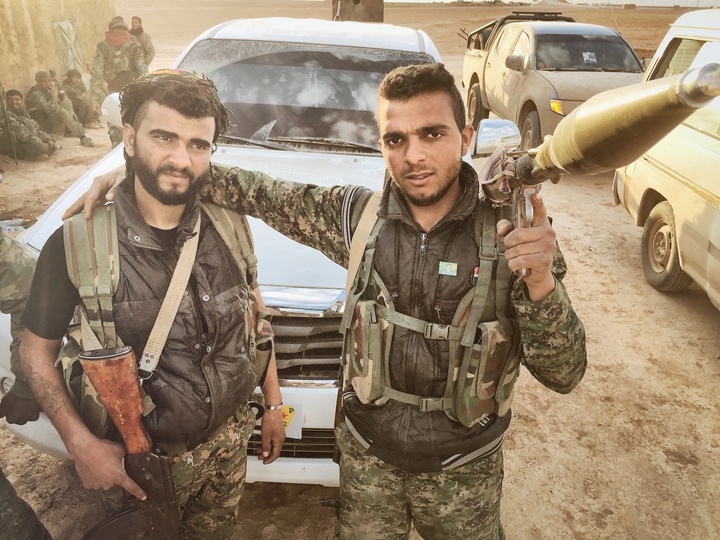
Soldiers from an all-Arab unit outside Al-Shaddadi, Syria, on April 16, shortly before the ISIS stronghold in that city fell.
The first action the unit saw was in the Al-Shaddadi offensive, a relatively quick and effective operation aided by airstrikes from the U.S.-led coalition. Hagg’s volunteer medical unit only wound up treating two injured soldiers.
“After they cleared the city we started volunteering in the hospital, helping with surgeries and starting to brush up on our training and expand our unit,” said Hagg, who’d received medic training in the Navy. During his first few months in Syria he focused on filming but also served as security and a backup medic. But with virtually no other combat medics among the YPG, Hagg’s unit became more and more valuable, and his growing medical skills took precedence.
”It took about three and a half months for me to transition from being primarily a filmer to being one of the primary medics,” he said. While it went against his training as a storyteller to become part of his own story he simply couldn’t maintain a detached perspective given what he was experiencing. “These kids go into battle with no medics, no medevac, no way to get to the hospital other than in the back of a pickup truck, wrapped in a blanket,” Hagg said. “And they just die in droves because of that.”
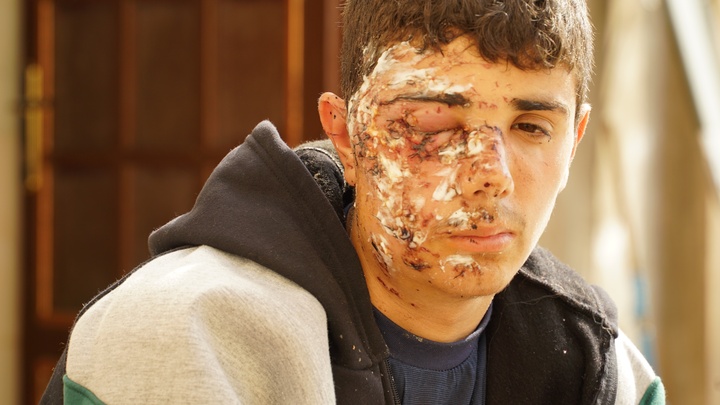
A young Syrian man received treatment at a hospital outside Al Shaddadi after being injured from a suicide bomber in March.
By the end of March Hagg’s unit was conducting three-day life-saving courses for YPG soldiers, teaching them skills such as how to apply tourniquets, chest seals and IVs. Over the next couple months his unit trained roughly 150 first responders and traveled to Syrian hospitals collecting bandages, serum, IV fluids and other equipment. They even found an old ambulance and got it running.
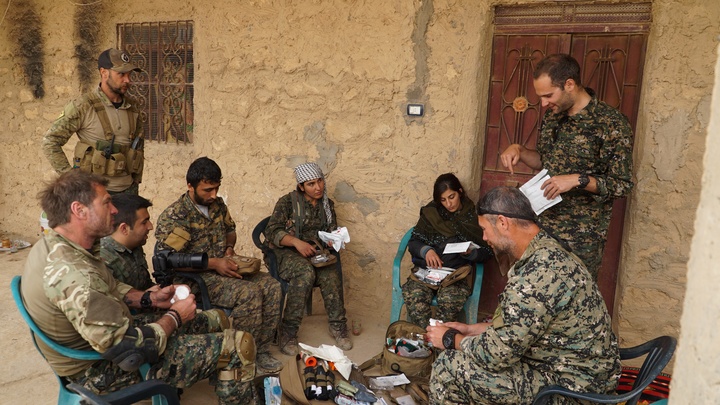
Hagg’s medical unit conducting a life-saving course, in which they taught locals how to maintain airways, stop bleeding and evacuate injured fighters.
On May 27 Hagg and his group were deployed as a combat medic unit. They thought they were headed to the Northern Raqqa offensive but instead their convoy diverted to the northern city of Mambij, an ISIS stronghold being targeted by U.S.-backed Kurdish forces. In Mambij ISIS soldiers — or Daesh, as Hagg and many others call the group — were known for being well-trained. Hagg and other medics were outfitted with weapons. Hagg said he carried an AK-47 made in 1975, and in Mambij he found cause to use it.
His unit spotted a vehicle-borne improvised explosive device, or VBIED, headed in their direction. These vehicles, often packed with thousands of pounds of explosives and driven by suicide bombers, can be devastating. Hagg described the VBIED as “a terrifying instrument of destruction.” (Here’s video of one detonating.)
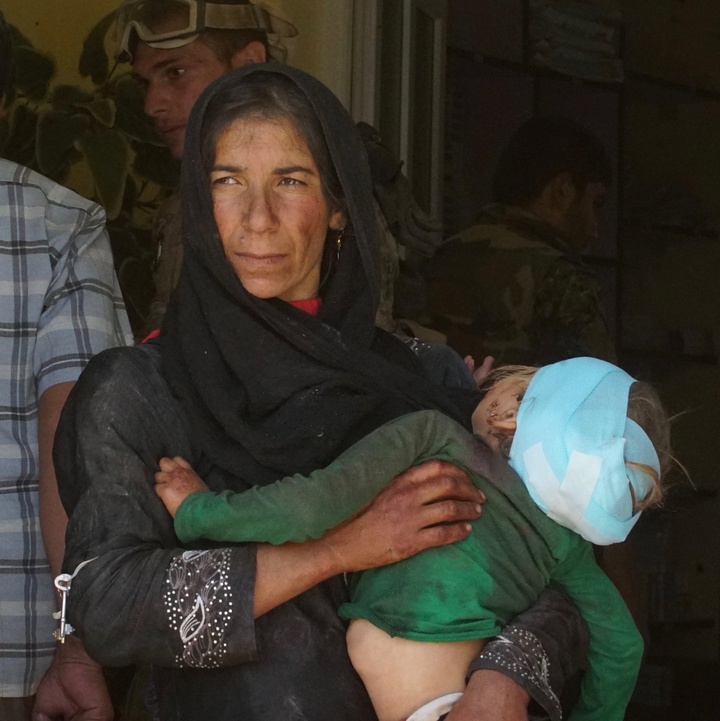
Outside a field hospital, a mother holds one of her two sons, both of whom were injured by land mines while trying to escape Mambij.
Fortunately, this VBIED hit a small landmine that disabled it without detonating the payload. The passenger exited the vehicle and Hagg, worried he might be holding a trigger, opened fire. “Probably my tenth shot I clipped him in the hip,” Hagg said. “It was really far away, and it was a really lucky shot.” The injured man scrambled for cover, but Kurdish soldiers tracked him down and killed him.
Asked how it felt to have facilitated a man’s death, Hagg didn’t hesitate.
”Those fucking scumbag fuckers,” he said. “What they do to people is beyond sick. I don’t take enjoyment in it, in causing another human harm. But I take pride in knowing I stopped somebody that was just a brute killer.” In Syria he’d come across ISIS “rape houses,” inside of which was bloody underwear and child-sized bloody handprints. He’d seen people with their mouths sewn shut for eating during Ramadan; people with their hands chopped off for possessing cigarettes; people who’d been drowned, tortured and sodomized. “It’s medieval,” he said bitterly. “The opportunity to eradicate one of those people from this Earth was something that I was proud to say, yeah, that dude isn’t gonna be hurtin’ nobody else.”
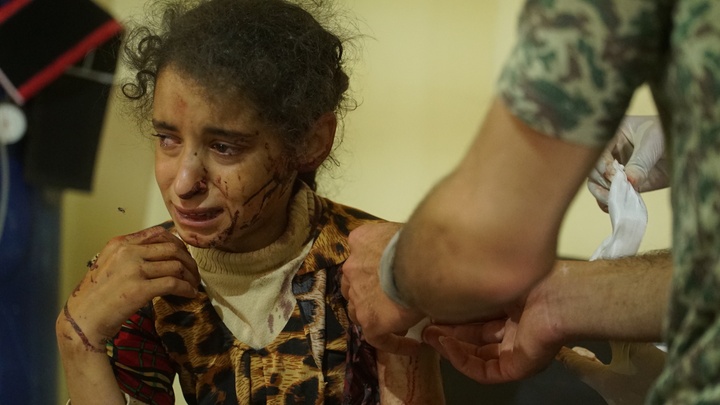
“This little girl was hit by an ISIS land mine trying to escape the city [of Mamij] with her family,” Hagg said. “Her father lay on the floor next to her [and] did not make it.” Hagg’s unit treated 21 injured civilians this day.
Yet Hagg also treated injured ISIS soldiers, “And I provided them the exact same level of care that I would have provided any other casualty that was in front of me,” he said. “As a combat medic I’m armed. I kill first and heal second.”
In Syria Hagg communicated with his wife only sporadically. Back in Eureka Summers had gone from nervous to angry to, finally, detached. “The reality of him being gone, it was almost like he died,” she said. “I didn’t know when he was coming back. I didn’t know if he was coming back. He took a huge risk. He went there with no life insurance. He sold everything he could, took every bit of money he could and just left. That’s why I turned it off.”
Hagg realized their relationship was at rock bottom. “It got to a point where I had to leave [Syria],” he said. “If I didn’t leave I wasn’t going to have a family. And I barely got home. And I barely have a family.”
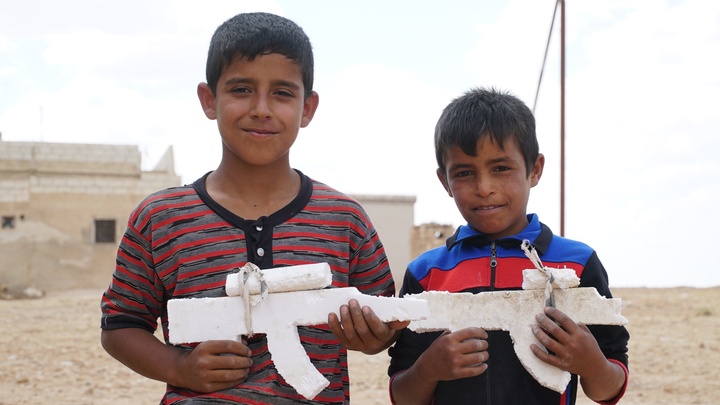
On the outskirts of a village near Mambij, just hours after it was liberated from ISIS, two brothers pretend to be Syrian soldiers. “The bigger one speaks Kurdish, Arabic and some English,” Hagg said. “We became buddies for the few days we stayed in this village.”
Hagg had served his six months, and he began to plan his departure, which would require getting back into Iraq. The problem was that the peshmerga (PUK), or Iraqi Kurds, had sealed the border. They weren’t allowing people, supplies or food to cross. Hagg sought to grease the tracks by contacting Schroder here in the U.S. Schroder then contacted friends with the state department who contacted a group that works with the PUK, and before long Hagg got word that he had permission to cross into Iraq with his passport.
”When I attempted to do that I was immediately arrested and detained,” he said. Iraqi soldiers took him to a detention center in the city of Dohuk, where he heard people screaming in agony, he said. After about 24 hours he was transferred to a prison in Erbil, where he was held with 74 other captives in a room that measured 16 feet by 35 feet, Hagg said. Most of the prisoners were Arab men suspected of helping ISIS, though there were also Kurds accused of smuggling and, after a few days, other Westerners.
Asked why he was being held by a group ostensibly on the same side — that is, fighting ISIS — Hagg explained, “I was captured and held as a political prisoner in [retaliation] for me going to the YPG and not going to the peshmerga.” For the first week or so of his captivity Hagg was told daily that that he’d be released the following day, but the days kept coming and going with no release. At one point FBI officers came and questioned Hagg, telling him that by joining a foreign militia he’d technically committed a felony. (Agents have since told him they’re unlikely to prosecute.) And then one day he was told by his captors that because of the political situation in Turkey, Iraqi policies had changed and he would be held prisoner for two years. “And i just felt like my life was going to be over,” Hagg said.
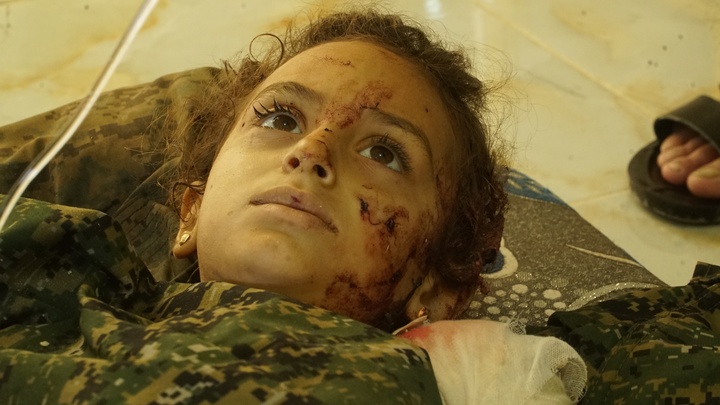
(Above and below) A young girl in a field hospital outside Mambij receives treatment after being hit with shrapnel in her arm, chest and legs. Her leg had to be amputated.
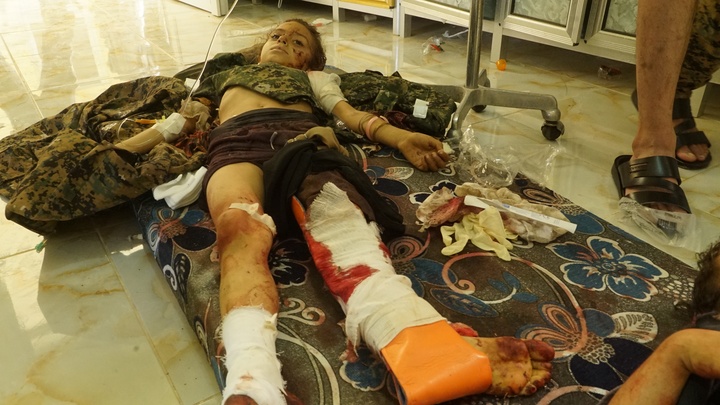
Inmates were made to lie down on the concrete floor — shoulder-to-shoulder and chest-to-back — in 100-degree heat for 21 hours at a time, Hagg said. “And then you’re being psychologically tortured, listening to the guards beat up other inmates. They come back with broken fingers. A guy came back with a smashed testicle.”
Inmates were allowed out of the group cell three times a day to spend 40 minutes in a courtyard, Hagg said. The bathroom was essentially just a hole in the ground. Prisoners were allowed to sit up and eat meals off the ground. Hagg described the food as “a lot of beans, tomato sauce and a lot of naan,” plus protein of some type three times a week. “I actually ate much better in Iraqi prison than I did in the YPG,” he said.
Nevertheless, the captivity was excruciating. After 18 days Hagg was allowed to use his cell phone for three minutes. He called his wife and spoke quickly. He told Summers where he was, gave her the contact information for the U.S. consulate in Erbil and asked her to spread the word, get everyone she knows to pressure the consulate into releasing him.
Summers didn’t know how to react. After recovering from the shock her initial response was anger. “I hated it,” she said. “I started to hate him for what he had done.” He’d called in the morning, California time, and Summers delayed doing anything, “because I didn’t want to have to face how I was feeling if he came home.” She remained dazed throughout the day. “And at night I said, ‘You know what? It’s my job to do this. I need to bring him home.’”
At 10:17 p.m. on Aug. 10 Summers published a Facebook post with a picture of Hagg in full combat fatigues, a link to the “contact us” page for the U.S. consulate and a plea for people to help. Within hours more than 50 people had contacted the consulate, and U.S. officials quickly secured Hagg’s release. With financial help from Schroder Hagg made it out of Iraq, and several long flights and a diversion to Medford later he was home.
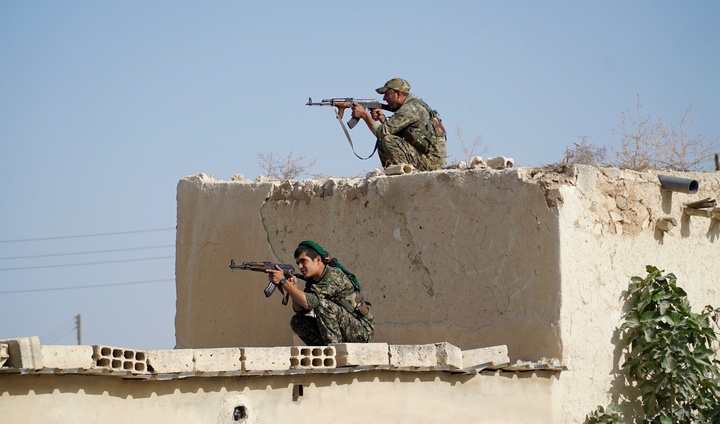
YPG soldiers work to clear villages near Mambij.
In 2005 Hagg had come back from Iraq angry. This time is different. “I think I came back more peaceful than I’ve ever been,” he said. “I cry here or there just thinking about these kids [who were killed], but I didn’t cry in the moment. … I think being able to save lives made the difference for me.”
Hagg is amazed that he managed to get out of Syria and Iraq with the hard drives holding his documentary footage. With help from Schroder and other media colleagues he now hopes to craft the footage into a documentary project, either a series or a feature film. “I never thought I’d become a major player [in the project], but it really follows my experience in Syria,” he said, “starting out as a documentary filmmaker and being thrust into the role of a combat medic.”
Summers, meanwhile, has opened the Victorian as a boutique hotel. Their elder daughter, Arcata, has been down with her parents in Southern California, but Hagg is back home as a husband and a father — at least for the time being.
“I wanted to marry River, and I did not know what that would entail,” she said. “But I also think that I’m a person, as he is, that would be bored with anything less.”
Outside the Victorian the couple posed for photos, Summers holding little Alyna-Rose on her hip, Hagg looking rugged in boots and camouflage cargo pants. He had a custom-built motorcycle parked out front, and he got a mischievous twinkle in his eye talking about it. He admits to being drawn inexplicably towards conflict and danger, but he said his choice to join a foreign militia and fight ISIS wasn’t about that — or at least not only that.
“I volunteered for everybody, not just myself,” he said. “[It was] for my community, for Humboldt County, so Humboldt County can say, ‘Yeah, we had a guy go over and fight Daesh.’”
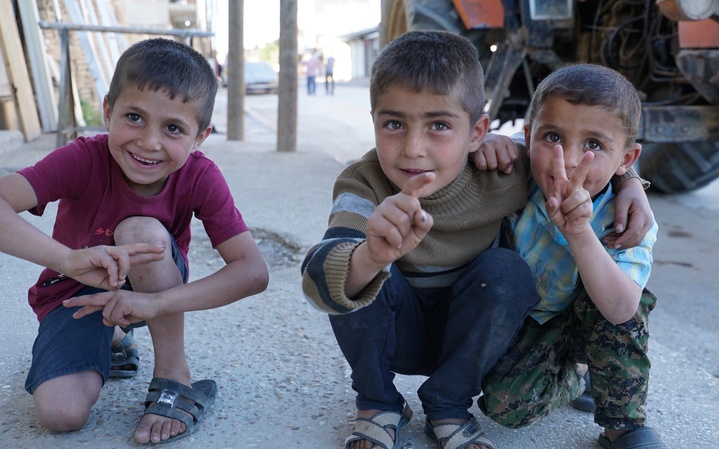
In a Christian neighborhood of Tell Tamer, Syria, on May 16 Hagg met these three boys, who were excited to meet an American YPG.
CLICK TO MANAGE